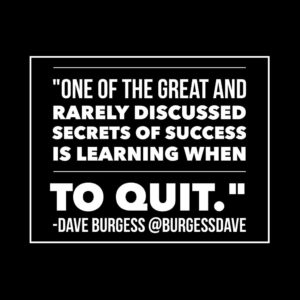Did you hear the story about the person who started a single project one day, never faced failure, was wildly successful, and lived happily ever after?
Yeah, me neither!
It wouldn’t be a very good story, anyway. Any writer of fiction knows you need some sort of dramatic tension; a story needs to build. The protagonist needs to face twists
and turns and overcome adversity. There has to be conflict and resolution.
Of course, success in the “real world” comes the same way. If we are only willing to start projects that have no chance of failure, we are doomed to a life mired in mediocrity and the safe but soul-killing sameness that comes from hiding in our comfort zones. If we’re unwilling to embark on endeavors with risky and unclear outcomes, what we’re really saying is that we don’t intend to start anything of great significance. Attempting great work and living with the risk of failure and rejection are two sides of the same coin. They can’t be separated.
I’m here to announce one of my failures to the world. We are officially killing West Hills Stories, the teacher-initiated, teacher-led, and teacher-produced blog that was created after a summer conversation between Dan McDowell, Reuben Hoffman, John Berray, and me. I was pretty energized by the idea that we could create a forum for teachers to share their stories about life in and out of the classroom at West Hills. The goals were to improve school culture, create a more connected staff, and just provide a space for us to learn a little more about our school and each other. Unfortunately, we are pulling the plug.
Why?
Simple. Lots of people (based on comments we have received) enjoyed reading them, but not nearly enough people were willing to write them. I have lots of theories as to why, but that would be a longer blog. Bottom line…not enough people stepped up and were willing to contribute. Of course, we could keep it alive by just writing the posts ourselves, but that kind of defeats the purpose. Thank you to those of you who wrote a post; I can honestly say that I enjoyed each and every one. They were awesome. Thank you, also, to those of you who read them. If you haven’t read them, I encourage you to go back and look through the archives
I want to be clear. I’m not bitter about it. We had no idea if it would work and we went for it anyway. It was a worthwhile project that produced great work while it lasted.
One of the great and rarely discussed secrets of success is learning when to quit. The old cliché, “winners never quit and quitters never win,” is horribly misguided and false. Learning how to selectively quit projects and tactics that aren’t bringing us the results we want is the only way to free up the time, energy, and psychological space to start new projects that can ultimately lead to greater success. If you’re interested in learning more about how to choose what to quit and what to stick with, Seth Godin wrote a whole book on the subject called The Dip. It’s a quick but interesting read (In fact, just read everything he ever wrote!).
Looking at our life’s work as a series of projects instead of one long journey provides a profound and useful paradigm shift. A project-based worldview makes failure seem temporary and less significant. If our whole life is wrapped up in everything we do, of course we will be afraid to fail or to make a mistake. Seeing our life’s work as a single entity doesn’t just make failure seem more painful and therefore tempt us to aim lower, it also negatively impacts us when we experience success. It leads to an attitude of complacency and feelings of having “arrived.” Adopting the project paradigm means that whether you fail or succeed at any particular endeavor, the response should always be the same…”What‘s Next?”
So West Hills Stories is dead, but that only means that we will try to tackle another project. What’s next? Right now, I have no idea but I’ll guarantee you it will be something risky and…it just might fail.




